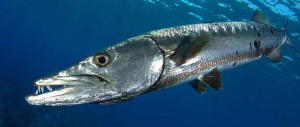Snake-like in appearance with prominent, sharp-edged, fang-like teeth set in sockets of large jaws. Large, pointed heads with a pair of intense eyes that pierce the blue water. Speed, with the ability to strike unsuspecting prey in milliseconds. These features make for a very formidable predator, and are a perfect description of a barracuda. Many snorkelers and divers are wary of swimming with barracuda, especially larger species such as the Great Barracuda; their sheer size, as well as reputation for having an aggressive temperament, often make swimmers reluctant to enter the water. But with almost 30 species of described, these large fish are greatly misunderstood, so let’s examine some of the myths surrounding the larger species of barracuda.
Myth: Barracuda Frequently Attack Humans
One of the biggest fallacies regarding Barracuda is that they are vicious predators that frequently attack people. Barracudas are relatively passive towards humans and while inquisitive, will seldom stalk divers with the intent to feed. When compared to attacks by other large predators such as sharks there have only been 25 documented and confirmed barracuda attacks in the last century which is a negligible number when compared with other predators. When attacks have been reported they are often severe lacerations but seldom fatal attacks, leading most scientist to believe that these attacks were caused by provocation or the barracuda mistaking the diver for prey. Most attacks with barracuda are on divers who are spearfishing, and try to wrestle away or deny the barracuda from taking away their catch and even these are few and far between to lend any credence to the “man-hunter” qualities of these fish.
Myth: Barracuda attack divers that carry shiny objects
Barracudas feed on reef fish such as jacks, grunts, groupers, small tunas, and others silvery fish and are known to attack first and ask questions later, which may have lead to the belief that barracuda blindly attack any shiny object underwater mistaking it for prey. While a glinting shiny object such as a stainless steel regulator, dive computer or wrist-watch, may catch the attention of the fish, it doesn’t mean that it will attack Many divers have proven this by trying to dangle shiny objects in-front of them to see if they will attack, and they seldom even approach the object when a diver is in its vicinity. The only reported barracuda attack caused due to shiny objects was said to be in murky waters where the barracuda wouldn’t have seen the person, thereby genuinely mistaking the human for its prey.
Myth: All Barracuda are Poisonous
Barracuda are not naturally born with any poison or toxic defence mechanism in them. The stories of barracuda poisoning are usually Ciguatera poisoning which a potentially dangerous form of food poisoning, caused by consumption of certain tropical reef fish particularly Barracuda. The poison is produced by a certain variety of a tiny marine organism known as a Dinoflagellates which are tiny unicellular marine plankton which typically grow on marine algae, sea grass and sea weed and are consumed by smaller herbivorous reef fish when they feed on the algae and grass. These fish are in turn eaten by larger carnivorous fish where the Ciguatoxin builds up in a process known as bioaccumulation. .This toxin is perfectly harmless for fish, but can be harmful to humans that consume the fish. Once again though it’s not necessary that all Barracuda have Ciguatoxin in them and the Bioaccumulation process may not have reached a stage where the fish can cause poisoning. However it is always safe to avoid eating large barracuda as there is no way to test for toxicity in the fish easily.
Now that you know a little more about these ocean predators, you can enter the water with a little less anxiety. There is actually a large barracuda that frequents one of our sites at Hastings Reef, and will generally float under the boat and watch all the snorkelers and divers. So when you are making your way out to the reef, keep an eye out for these amazing animals. Special thanks to Leisure Pro’s “Aqua Views” for the Barracuda facts.

